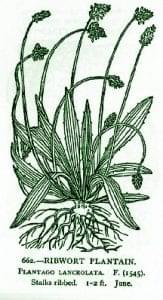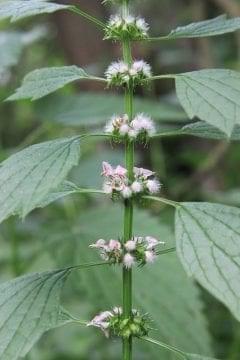Holy Basil also called Tulsi (Ocimum sanctum or Ocimum gratissimum) is highly researched herb for stress reduction that originated in India. It has a vast number of properties that earn its title as an adaptogen. Holy Basil is used as an antioxidant, corticosterone limiter, blood sugar reducer, nervine, hypotensive, liver protector, immune tonic and antidepressant. There are just a handful of its properties. With all of this going for it, it is no wonder that tulsi is considered sacred in India.
Tulsi contains triterpenoid saponins such as ursolic acid and flavonoids. Most adaptogens are heavy in these glycosides. The majority of adaptogens are from the roots of herbs. Holy Basil is one of the noted exceptions. As an aerial plant, it couples triterpenoid saponins with essential oils from the leaves to calm its consumers far quickly that root herbs which require digestion to enact. Other adaptogens that come from aerial parts include lavender and spearmint. The volatile oils interact with olfactory receptors in the nasal cavity to quickly ease tension. These are good adaptogens for first aid situations.
In general, adaptogens like tulsi reduces the effect of stress by interacting with 2 body systems. The hypothalamic-pituitary-adrenal (HPA) axis and the sympathoadrenal system detect stress and responds by flooding the body with hormones. These stress hormones such as cortisol puts us on high alert and depletes resources quickly to get us out of harms way. The problem is that, unlike in simpler times, we often have no recovery period from this situation so we are constantly depleted. Free radicals are generated faster than we can neutralize them with antioxidants. As holy basil also contains antioxidants along with triterpenoid saponins, it is a trusted adaptogen worldwide.
The term adaptogen is a holistic term that refers to an herb that helps the body recover from stress by supporting metabolic functions. Adaptogens can work in a number of ways on a number of systems. They may moderate the endocrine or immune system. They may be defending against a variety of stresses from physical to emotional. An adaptogen helps achieve homeostasis amid unrest. There is flexibility with this term. What may work for one person as an adaptogen, may not work for another person. The effect depends on the source and reaction to the stress.
Holy basil inhibits cortisol release. Cortisol is important for survival but too much causes damage. The lingering effects of high, continuous bursts of cortisol perpetuates the shut down of normal body activity and results in poor immune function, irregular sleep and evetual damage to cardiac or thyroidal (endocrine) systems among others. Clinical trials have shown that tulsi also exhibited a significant CRHR1 receptor antagonist, 11β-HSD1 and COMT activity.
Dosage
Some people find holy basil calming while others find it invigorating. The individual reaction should dictate the times of use. When using capsules for tonic effects, the suggested dosage for tulsi can range from 300 mg to 2,000 mg per day. As a treatment for stress-induced conditions, the dosage ranges from 600 mg to 1,800 mg taken throughout the day. Tinctures vary in strengths (1:5-1:2) and quality. It is usually suggested to tulsi tincture .5ml in the morning and 1 ml at night depending on the person’s reaction. Tulsi tea is delicious. Take it daily.
Contraindications
There is evidence that holy basil is one of the many plants may speed the production of Cytochrome P450 (CYP), a hemeprotein that plays a key role in the metabolism of drugs and other toxins in the liver. It is contraindicated, for people taking medication that must store in the liver. There is no evidence at the time of the this writing that tulsi is contraindicated for pregnant or nursing women.
Further Research
Science Direct: Triterpenoid Saponin
NCBI: Ocimum sanctum Linn. A reservoir plant for therapeutic applications: An overview
American Family Physician: The Effect of Cytochrome P450 Metabolism on Drug Response, Interactions, and Adverse Effects
NCBI: The Clinical Efficacy and Safety of Tulsi in Humans: A Systematic Review of the Literature






